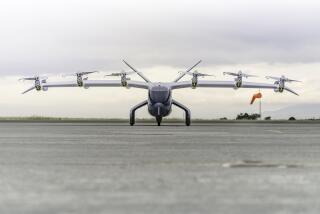Archer Plans to License ‘QSound’ to Nintendo
- Share via
Archer Communications Inc., a small Canadian firm bent on developing and selling a three-dimensional sound technology, said Wednesday that it agreed to license its “QSound” system to Nintendo of America Inc., which dominates the video game industry.
Although the agreement was conditioned on certain undisclosed requirements being met in the next 90 days, the news sent Archer’s stock up $1.50 in over-the-counter trading in the United States, to $19.375 on volume of 270,500 shares.
The high-flying stock of the Calgary, Alberta, firm has come under scrutiny by regulators and the financial press because the company has yet to ship a product or record a profit, yet its market value has soared to more than $200 million. In June, the Securities and Exchange Commission mailed questionnaires to some shareholders asking how the company’s stock was brought to their attention.
Archer began courting the Hollywood film and recorded music community two years ago, and now counts among its investors the post-production film company of Todd A-O, film producer George Folsey Jr. and record producer Jimmy Iovine. Late last year, the powerful talent agency, Creative Artists Agency, agreed to represent the sound technology in exchange for stock warrants and a percentage of the firm’s revenue.
But the company has repeatedly missed its own deadlines to introduce the technology to various industries, heightening the suspense about whether it would secure an agreement with a video game manufacturer.
Wednesday’s announcement appeared to allay some, but not all, questions about Archer’s product for the video game market or the impact on Archer’s earnings. Neither company would divulge how much Nintendo has agreed to pay in royalties or guaranteed minimum payment. Nintendo will invest about $5 million in exchange for 294,000 shares of Archer’s stock as part of the deal.
Archer President Lawrence G. Ryckman said the royalty on game units may be in the “medium price range” of 10 cents to $1.25. He estimated that as many as 50% of Nintendo games might use the technology. One industry source said Nintendo expects to have 45 million units on the market by year-end.
Howard C. Lincoln, senior vice president of Nintendo of America, declined to say just how much the technology will cost consumers, who spend about $80 to $110 for video game consoles and $25 to $50 on individual video games. But he acknowledged that consumers initially must purchase a device to enable them to hear the enhanced sound.
“We’re pleased to have concluded this agreement, and if the conditions are fulfilled within the 90-day period, we’ll have further announcements,” Lincoln said.
Neither Lincoln nor Ryckman would spell out the conditions, but the Archer president said they are “not onerous” and are legal in nature, such as proving ownership of certain patents.
“It isn’t (a question of) . . . technology, like ‘does it work’,” Ryckman said.





